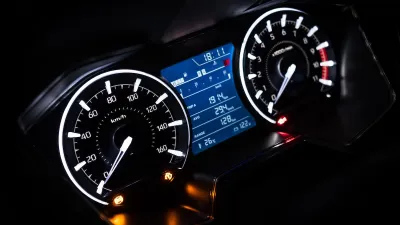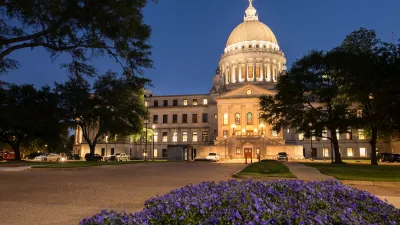It could be a win-win: Reducing the deficit, stimulating job creation, and avoiding the dreaded 'fiscal cliff'. Those pushing for a gas tax increase have joined other industries in using the need to raise and/or cut $500 billion to avoid recession.
Josh Mitchell writes how various industries are hoping to cash-in on Congressional and White House talks on creating "a $500 billion combination of tax increases and spending cuts set to begin Jan. 2", i.e. what is necessary to avoid falling over the 'fiscal cliff' on Dec. 31, plunging the nation possibly into another recession.
"The U.S. government spends roughly $52 billion a year on highway and transit projects, but the gasoline tax is generating only about $37 billion annually. That has created a roughly $15 billion annual shortfall that Congress has filled in recent years by taking money from the government's general fund, adding to the budget deficit." It is precisely that shortfall that caused the 2010 Simpson-Bowles deficit-reduction commission to include a gas tax as part of a broad deficit-reduction plan.
"President Barack Obama has opposed raising the gas tax. The White House didn't respond to requests for comment. Representatives of House Speaker John Boehner (R., Ohio) and Senate Majority Leader Harry Reid (D., Nev.) didn't respond to requests for comment."
However, Obama does advocate transportation spending to reduce unemployment - it was a major part of the 2009, $787 billion Recovery Act that was funded by deficit-spending. A small gas tax increase could fund needed construction, estimated to be an additional $138 billion a year at all levels of government by a congressional commission that "is needed to maintain the current system and to make modest improvements", writes The Associated Press' Joan Lowy in her article about additional funding needed to safeguard transportation infrastructure from extreme weather and climate change.
Speaking of climate change, earlier Steven Mufson wrote in The Washington Post that carbon tax advocates suggested that the fiscal cliff talks represented an opportunity to promote their cause.
William Pizer, associate professor of economic and environmental policy at Duke University, "said that a $20-a-ton tax on carbon dioxide would raise gasoline prices by about 20 cents per gallon and boost electric bills slightly. It could be most efficiently collected “upstream,” at coal mines, oil and gas wells, or terminals for oil tankers arriving at U.S. shores."
President Obama was quick to pounce on that option.
"We would never propose a carbon tax, and have no intention of proposing one,” White House spokesman Jay Carney said.
Would he be more receptive to a gas tax?
Note: Access to article may be time-limited without subscription
FULL STORY: Higher Gas-Tax Idea Joins Fiscal-Cliff Talks

Alabama: Trump Terminates Settlements for Black Communities Harmed By Raw Sewage
Trump deemed the landmark civil rights agreement “illegal DEI and environmental justice policy.”

Study: Maui’s Plan to Convert Vacation Rentals to Long-Term Housing Could Cause Nearly $1 Billion Economic Loss
The plan would reduce visitor accommodation by 25% resulting in 1,900 jobs lost.

Why Should We Subsidize Public Transportation?
Many public transit agencies face financial stress due to rising costs, declining fare revenue, and declining subsidies. Transit advocates must provide a strong business case for increasing public transit funding.

Wind Energy on the Rise Despite Federal Policy Reversal
The Trump administration is revoking federal support for renewable energy, but demand for new projects continues unabated.

Passengers Flock to Caltrain After Electrification
The new electric trains are running faster and more reliably, leading to strong ridership growth on the Bay Area rail system.

Texas Churches Rally Behind ‘Yes in God’s Back Yard’ Legislation
Religious leaders want the state to reduce zoning regulations to streamline leasing church-owned land to housing developers.
Urban Design for Planners 1: Software Tools
This six-course series explores essential urban design concepts using open source software and equips planners with the tools they need to participate fully in the urban design process.
Planning for Universal Design
Learn the tools for implementing Universal Design in planning regulations.
Caltrans
Smith Gee Studio
Institute for Housing and Urban Development Studies (IHS)
City of Grandview
Harvard GSD Executive Education
Toledo-Lucas County Plan Commissions
Salt Lake City
NYU Wagner Graduate School of Public Service




























